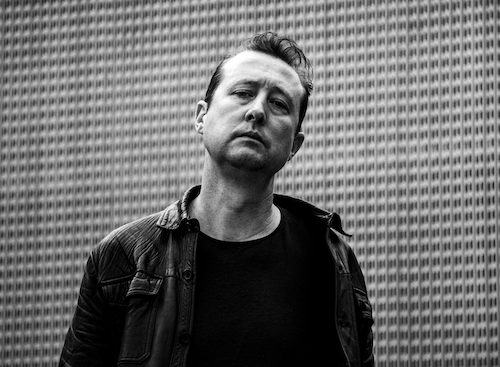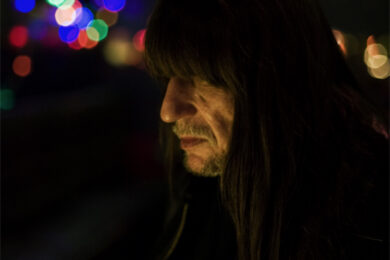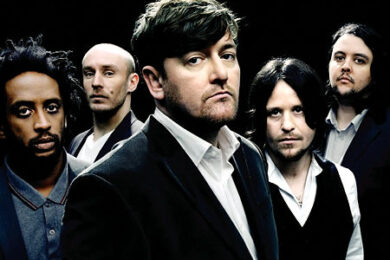To receive Shelter Of The Opaque by Vanishing become a Quietus Sound & Vision subscriber
The sullen skies over Manchester brighten momentarily as tQ begins a walk across the city with Gareth Smith, the Hull-born spoken-word musician behind Vanishing. He’s based here and is taking us on his daily walk around the city, something he began during lockdown and continued throughout the making of his latest, powerful album, Shelter Of The Opaque. Changing landscapes and our relationships with them are at the heart of the project: as places evolve, where do we fit into those, and how does it affect both our sense of self and our relationship to the past?
“This is a very working-class estate, this is where I live just here,” Smith says, pointing out his home in Ardwick. He lives in social housing just on the outskirts of the centre, in the shadow of the two local universities whose sprawling campuses continue to expand into the neighbouring residential community year-on-year. Teaching buildings and student halls loom large over Smith’s estate, creating vast shadows over terraces and green spaces.
He points out an old tree that’s been there for “seventy or eighty years” opposite where he lives. “There’s something horrifying that’s planned for that area,” Smith explains, of the land the tree is located within. “There’s a planning proposal to build a 41-story-building there. 1100 homes, including student homes.” The tower would envelop the already densely populated area. “The park behind is such a great resource for local kids and their families. It would be thrust into darkness.”
He says consultations about the new building have been minimal and some residents feel powerless to be able to influence decision makers. “Change happens, and I’m not opposed to change happening, but people’s ability to influence change in any meaningful way is becoming less and less tangible,” Smith says. “I get the sense that there’s not been any meaningful attempt to address the concerns of the public, which is not that surprising in the country we live in today, but it’s also still massively disappointing.”
The opening track on Smith’s latest album, ‘Maxim’, captures how cities like Manchester are in the grip of dizzying and often disorienting change as “skylines shift” and “memory, place [becomes] lost among the shadows of this marble, ornate, wilderness.” Over skeletal electronics and tense strings, Smith talks of “memories in places, they get harder to find”, and “city facades” that are “so good [at] disguising pain”; “arrogant possessor’s” of power who look on with little care for those around. As Smith says matter-of-factly on the record: “If drowning, let it drown, if falling, let it fall, if breaking, let it break… as this is the view of the world I know.”
Smith talks with warmness about his home, but also a sense of fear too – especially when thinking about the fragility of its future with powerful organisations hoovering up land in the area. “I love living here. It’s near town, it’s accessible. It’s a working-class estate and there’s a community. People spend their whole lives living in places like this – it’s not got that transitory population. To me, it’s a wonderful place. I just hope it’s able to carry on being like this. With so much change, nothing is ever certain.”
He wonders if more local control could help matters. “None of this is any kind of anti-Manchester sentiment. It’s the direction the whole country is going in. I do agree with having more local accountability though, and we need more spending on a local level,” he explains. “Westminster is a bit of a mess right now. It’s run by people who spend their whole lives in London, and they have no idea what it’s like living in the north: there isn’t much perspective. Manchester is quite an affluent city, but there are others close by where that isn’t the case. A lot of this record is me thinking about how we need more joined-up thinking about these things, to affect change in a meaningful way.”
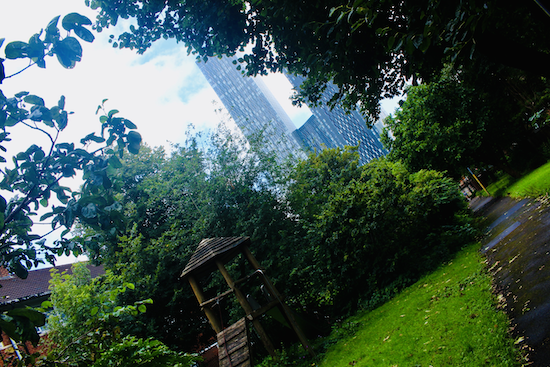
New buildings overshadow homes in Ardwick
We move out of Ardwick and onto the Oxford Road area of the city, just a touchstone away. It’s one of the busiest roads in the country and the sound of construction buzzes from every corner as jack hammers jolt and drills pierce. We try to walk through a pretty park opposite the All Saints university building, but we’re stopped from doing so and encounter barriers: JCBs are digging up the park and workers hurry about, carrying pickaxes and shovels. “I mean it will be interesting to see what they find in there,” Smith smiles wryly. “It used to be a graveyard.”
Some of the buildings we walk by date back to the 18th century, many of which are dwarfed by huge new university teaching blocks and student accommodation. “I’m always interested to see new buildings and old buildings smashed next to each other,” he explains, saying he’d spend a long time looking at these constructions during his lockdown walks when writing the album’s lyrics.
He catches sight of a large metal construction on the side of one of the older buildings (it looks like an old industrial air conditioning unit) as we circumnavigate the closed park to get back on our path towards Hulme. “It’s just an interesting composition, isn’t it?” he muses, admiring the structure. “I’m interested in things that look like a lot of hard work has gone into them, where you can see a bit more of the labour value of them,” he says, saying such structures can often trigger creative thoughts.
It’s perhaps no wonder Smith’s fascinated by things like this, considering his background. “Not wanting to sound like Keir Starmer’s dad, but I was a toolmaker,” Smith laughs, explaining he left school at 16 to become an engineer. “I made press tools, I was a fitter and machinist and did an apprenticeship for five years.” He went to work at 6am every day and eventually become a time-served apprentice.
The day after that milestone arrived, however, Smith quit his job in an industry he could see was struggling. “It closed down not long after I left; the decline was already there,” he recalls. “For generations, many of our communities were formed of workers doing the same job, all working together, socialising together, going to church together even. None of that exists anymore.”
He grew up in Hull where his father was a window cleaner, and his mother worked in various clerical roles. At 11, his father left home; he remembers how tough it was for his mother, now a single parent, in the days where women’s salaries were much lower than their male counterparts. “If she’d have been a fella, she’d have got a lot more wages than what she did unfortunately, as a woman,” he says. “I get quite angry about that stuff.”
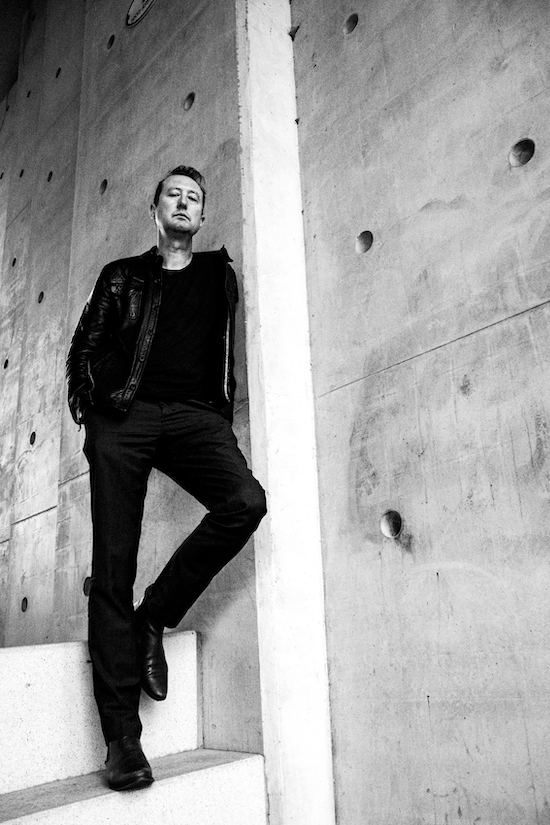
Smith says he always wrote down his thoughts on things like this in a notebook from being a teenager. He’d write about the world around him and would try to mould them into some kind of poetry and later, lyrics. Fellow teens on his estate introduced him to music – “it was like Queen and Guns N’ Roses at first,” he smiles, before he later discovered post punk via the Velvet Underground, Joy Division and Patti Smith or “the game changers,” as he describes them. His started to set his lyrics to music more and joined a band: he eventually moved to Manchester with them.
“It was a total waste of time,” Smith laughs now looking back on the band, who he says were “heavily influenced by The Fall.” “When we didn’t live together, we were much more productive,” he smiles reflecting on their lacklustre attempts at living and working together. “When I moved here, the flat I had was about £100 a month. You could land here without a job and get money quite quickly. I carried on playing, carried on gigging for a while. But after my father died, it was a trigger point to make some more changes,” he reflects.
Smith enrolled as a mature student at university following the death of his father and studied in buildings close to where we’re standing now. “I used my HNC in engineering to do an English and Philosophy degree. I’d never written an essay in my life. Some of those early essays must have been utterly terrible,” he laughs. He says his degree enabled him to focus on a purely creative existence and gave him time to write more of his own material. “I wouldn’t want to be studying nowadays, not with all that financial pressure,” he says, having gone to university before extortionate fees became the norm. “It’s such a terrible amount of money that’s hanging over you when you’re 18, it’s nuts.”
After leaving university, Smith began freelancing as a creative in the city, working with local theatres and homeless charities. The work, which involved bringing the arts to local communities, was mostly freelance, meaning he had time to focus on making music too. After discovering like-minded artists at Salford’s foremost creative hub at the time, Islington Mill, Smith released his first self-titled project as Vanishing in 2017, something he worked on initially with Gnod’s Paddy Shine. On that project, Smith’s vocals painted a gloomy, dystopian picture of the future over dark ambient electronica and neo-classical soundscapes.
55°N, 5°E followed in 2021, a work that recalled the death of his great-grandfather in the Dogger Bank area of the North Sea. Russian warships mistook a fleet of British fishing trawlers for enemy warships and opened fire. Smith performed it on the 113th anniversary of the disaster to acclaim, drawing comparisons to artists like John Cale, Vaughan Williams and Throbbing Gristle. He’s explored the story again earlier this year on another release, Ends Without Redress: a project that examined grief (including the death of his father more) as well the passage of time.

New build in progress
The music for Smith’s newest album was laid down first with Karl D’Silva and Sam Weaver at Rotterdam’s Worm studios ahead of lockdown and combines electronica, strings and woodwinds to create vast, cinematic soundscapes. Smith spent four years editing the tracks and making sure his lyrics “measured up to the incredible music that came out of [the studio].” Smith’s vocals are given much more room to soar than on previous records, allowing the listener space to appreciate both the words and the music equally (previously, he says he thinks the two things have been in opposition).
“I think the music breathes a lot more here,” he explains, saying it took a lot of “blood, sweat and tears” to bring it together. “And that’s to do with very simple stuff like sonic dynamics. I’m not afraid to have space in stuff anymore. The more space I bring into my work, actually the better it is I think because the words can breathe more then too.
“‘Surgical’ is a good example of that, there’s loads of space, bits going off, loads of gaps too,” he continues. “I don’t feel the need to fill the gaps anymore. At the end of the album ‘Inertia, Inertia!’ is a purely instrumental track to allow the listener to digest all that they’ve heard.” The album, where tracks segue seamlessly into one another, also feels immersive: at times you feel as if you’re next to the sea, at others as if you’re standing in the middle of an overbearing metropolis.
We suggest to Smith his album is also one of the most poetic he’s written to date, but he doesn’t see himself as a poet. “I don’t know what it is really,” he smiles. “I don’t know if I’d even describe it as spoken word. I just think of it as music with somebody speaking more than singing. I’ve tried to present the vocal a bit less emotionally. There’s less internal fighting going on with me on this record I think, just trying to explore things in a much more measured way. It allows more room to think. It’s more cohesive and more of a statement of who I am at this moment in time.”
The passage of time runs throughout the album. The track ‘Castling’ recalls Smith’s roots in Hull – “how quicky I feel a sea’s embrace” – he says at the start of the unsettling track, the call of home feeling ever present as he seeks to understand his past in the context of the present. The song is also one of several on the album that explores climate change too: the drones on the track sound like an electronic sea of sorts, and one that threatens to subsume its surroundings at any moment. An underlying ticking beat stresses how time is running out for the planet. “Wildfires, flood risks are things touched on throughout the album – places I’ve a connection to, places I don’t: ones we’re all forced to engage with via the news,” Smith explains.

We meet soon after over a hundred people are killed in wildfires in Hawaii and news of climate change is once again all over the news. “I mean that right there should just fucking end any of this debate about whether or not it’s happening, whether or not it’s there,” he says about climate deniers refusing to accept the seriousness of what’s happening to the planet. “Whether it’s man made or not it doesn’t matter,” he says. “It’s happening and needs to be taken seriously.”
He speaks a lot on the album about how humans process such challenging incidents. “How do we live our lives and not feel oppressed by what’s happening? I’m not a cynical person, but I don’t quite know the answer to how we keep moving forwards as humans do in a positive way [with this going on].”
He continues: "I’m navigating a lot on this album about how places work, how they don’t work but it’s all infused by this sense of stasis. The music represents this as well; a lot of the rhythms don’t resolve giving a sense of something not quite fitting, not quite coming together. There’s a feeling of being stuck, of not being quite sure what to do with the changes we see around us.”
Smith frequently heads into imaginary, dream-like worlds on the album to escape his physical surroundings and that feeling of stasis. The soaring ‘Electric Prayer’, which imagines a sea creature breached on a beach, is a good example. The creature dies before the sea comes in as Smith says “how cruel to see futures arrive too late” on a track where the protagonist tries to wrestle with how necessary change can sometimes be, even when it feels uncomfortable.
“It’s a metaphor to talk about why change can’t come soon enough sometimes, as difficult as that may be. I try to take myself out of one world and posit myself in another to see more clearly sometimes,” he says, explaining that it can help bring him perspective.
The album seems to call for more measured change, rather than the instantaneous ones we’re seeing around us on our walk today. As we head further into Hulme, we stumble on a second construction site at the edge of another new development. He remembers the work on these buildings continuing during lockdown.
“The working classes, as always, [were] sent out to work. People on the tube, the builders, nurses, all sent out without the proper [PPE] gear,” he reflects. “People were fucking dying while people in management jobs were working from home. You do get windows into the inequalities of society very quickly and that was a big one.” He says the PPE scandal is still on his mind too. “People should be going to prison for that stuff. So many in the Tory party on the make.”
“There’s a lot of opposition right now in the world and you see it in this city,” he continues. “There are people struggling. There’s loads of people doing really well – there’s so much money flying around this city – you only have to look at these buildings,” he says, pointing to new multi-story office blocks as we head over a bridge in Hulme towards the city centre, “but it’s becoming more and more extreme. This city is becoming a bit of a city of haves and have nots and I don’t really like that.”
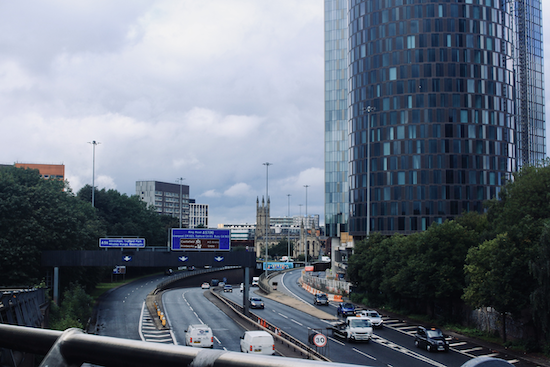
Towering over the city, Hulme
While the city presents itself as one thing on the outside publicly – the glistening new buildings seemingly a measure of progress and development – underneath that, Smith says is still a lot of suffering. “What is the city if not for its people?” he says. “This here is the public face of the city,” he says, looking out to shiny, glassed-fronted towers that look as if they’ve been lifted from a New York skyline. Around the sides of these buildings, however, you can see social housing estates in need of desperate council investment, empty factories, and the crumbling remains of local businesses that have long since gone bust.
“It’s disguising pain,” he continues. “This isn’t the reality for a lot of the people here. Everyone’s kind of fronting up a little bit at the moment. I get the sense a lot of people are struggling to make ends meet, and to make sense of the world. All this,” he says, gesturing at the buildings, “feels like a façade.” As we carry on towards the outskirts of Castlefield, it’s not long before we see tents underneath canal bridges and soggy cardboard homes destroyed by the day’s earlier downpour as the city’s homeless try to find new shelters for the night: the juxtaposition between the two sides of the city is stark.
Smith, who has been active in the Labour Party previously, says politics are an important part of the album. “A lot of things have happened in the world over the last [few] years. It’s just gone more and more insane. I am a political person: I am very engaged in politics and very interested in the human condition. I wanted all those things to be on the new album, but not in a preachy way. I wanted it to feel like we’re moving through it on a wave. It’s lapping in and touching you, not subsuming you.”
He says he hopes change is on the horizon with the expected election next year. “There’s been so many people in the Tory party on the make for years, lining their own pockets, looking after themselves,” he says. “The Nadine Doris thing,” he adds, speaking about the recent allegations that she sent “forceful” messages to senior civil servants after she was blocked for a peerage, “was a fucking joke. People are just absolutely sick of this stuff. Where are the priorities?”
“As much as I didn’t agree with the Brexit outcome, it shows that people were desperate for change,” Smith continues. “Now it’s about how can we create a new country. If governments don’t rebuild the country, then we have to rebuild it. But where do people start? I am hopeful change will come but it’s clear we need significant change to rebuild the decimation of the arts, society and so much more over the last few years.”
He wonders if a process of reindustrialisation might help – “building things we need at home” – but one with a pioneering green agenda. “It would give people good, long-term jobs, purpose, and, crucially, hope. I think people are desperate to feel a sense of purpose to navigate this world; that’s when people are at their best – when they’re feeling positive and hopeful. People can do wonderful things in that state of mind. We have to be optimistic; we have to be hopeful. The alternative erodes you; the alternative kills you.”
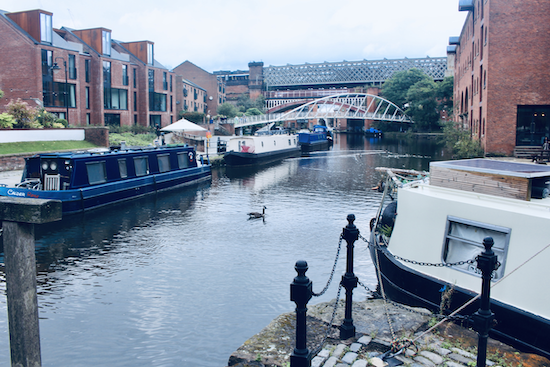
Rare moments of calm Castlefield
Smith tells us he personally finds hope near Castlefield, where the old city and the new city marry more harmoniously. He lights up walking through this area now, describing it as “a moment of peace.” “Look at that there,” he says, looking up to a bridge that dates back to Victorian times. “That’s kind of beautiful isn’t it?” he says, admiring the structure as canal boats glide underneath. “That’s been here well before our great grandparents and likely be there long after we’re gone.” It triggers off a thought in his head about time. “We’ve got maybe a hundred years at best here and it makes me think about change and if there’s a right way to navigate that change.”
On the spatial ‘Surgical’ over a lone clarinet and a subtle electronic heartbeat, the freedom Smith feels in places like this is evident. “My thoughts escape / to a place still, serene / without the noise or pressure of wants and fears / And here, I think how I want to think / I speak how I want to speak / I become that greater part of me.” He says such spaces often allow him to think about the bigger picture.
He continues: “In a city like Manchester where the change feels accelerated, what are you supposed to do when you see change? Do you just move with the shape of the change and don’t push back against it, or when things go wrong, when you see there’s a kind of injustice going on, should you push back against that? I’m concerned about these things as an individual.”
Beyond the canal and Castlefield bowl, it’s a short walk to Spinningfields, one of Manchester’s newest areas and the difference between the two places jars. It’s full of huge corporate buildings, affluent restaurants plus high-end gyms. Most of the time, it’s eerily ghost-like as many of the buildings sit half-empty. It’s an area with little soul or life and it’s where Smith says he feels most disorientated in the city.
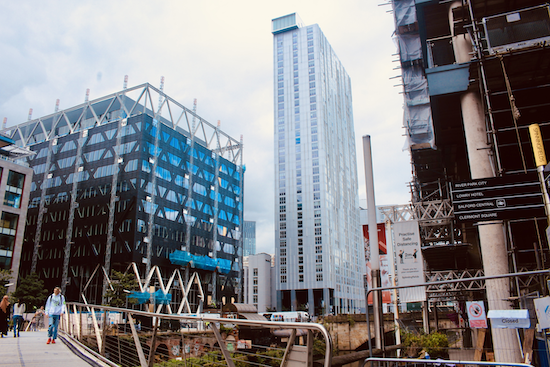
New construction at Spinningfields
“I mean what is this area, really?” Smith wonders as we look at the buildings. “What is it doing? What’s it for? I find it quite an alien experience to walk around here he says.” It’s a feeling he explores on tracks across the album, like album centrepiece ‘I Dream Of Circles’ where he describes being in “rooms of no matter / no gravity, no floor / no taste or smell”, the music soaring to the point where Smith seems to leave his own body.
It’s also a track where Smith explores mental health and a “slow, moving tiger” becomes a metaphor for creeping, circling depression. “If I’m not creative, I become unwell,” Smith explains. “So there’s an element of therapy through being creative for me.” In lockdown, without the “energy” of the people in the city, isolation was a challenge for Smith who usually did most of his creating in the city (before lockdown, he’d often go to the city’s central library to write). “A lot of people can’t be in public when they’re creating but it’s the opposite for me. The very first moments of lockdown, walking around an empty town was a very strange experience…The energy of people stimulates me.”
‘I Dream Of Circles’ seems to navigate the emptiness and disorientation Smith felt. High-pitched slasher-movie like strings pierce over a dull, heartbeat synths as he asks: “Have you ever felt your blood was a stranger, an unwanted guest, an emptiness awake inside your veins that makes hollow you days? Have you ever felt yourself exposed, naked, aghast for all to see? A thin, angled bone to be ridiculed, no longer in a human home?” The track deconstructs continually, with jazzy instrumentation colliding with foreboding electronica.
“It feels a bit like the narrative centre piece of the album,” Smith explains. “With tigers, I’m talking about depression, a bit like the black dog imagery but trying to make it a bit more imaginative. It’s a track born out of how to function in the world too, the kind of everyday stuff that comes along and makes you question where you fit into the world. Maybe some of the sounds relate to me getting older too. That’s been on my mind lately as I go further into my forties.”
The album feels like Smith’s most introspective album to date. He says it’s difficult sometimes knowing how much of yourself to put on display when writing an album like this. “I like that little thin line of ambiguity,” he says. “You can straddle it in a way that makes you feel comfortable, where you’re expressing something that’s very personal, but you can do so in a way that isn’t totally overbearing or exposing. I think I’ve gotten to a level here where I’m more comfortable with that.”
We’re close to the centre now on our walk as we walk past the Cathedral and into the Arndale area where people hurry to and forth from shops, offices and cafes. We take a moment to look around. “It’s probably time too I wrote a more optimistic album,” Smith laughs, looking ahead to the future.
He talks about what Kraftwerk did in the 1970s as a starting point. “They came in and delivered an idea of what Germany could be in the future,” Smith says, noting the similarities between cities like Manchester and Berlin – cities always in flux. “They reappropriated the bad things that had happened in that country and made this new narrative out of that. They created a new sense of space out of something quite dark. I’m always interested in that, because the music feels very hopeful. I’d love to do something like that next,” he says, joyfully, before heading back to the beating heart of the city as the rain starts to fall once more.
To receive Shelter Of The Opaque by Vanishing, as well as a host of other benefits including exclusive essays, podcasts and playlists, and loads more specially-commissioned music, become a Quietus Sound & Vision subscriber. You can do so here


